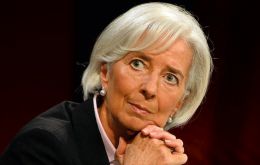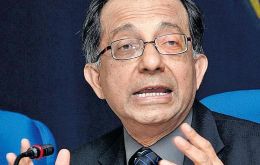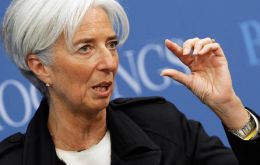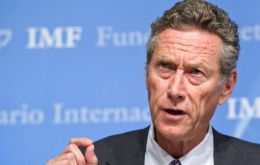MercoPress. South Atlantic News Agency
Tag: International Monetary Fund, IMF
-
Monday, October 12th 2015 - 09:18 UTC
Lagarde blasts US Congress for blocking reforms: “they jeopardize IMF's credibility”

Washington's use of its de facto veto at the International Monetary Fund to block reforms giving emerging countries a greater say is jeopardizing the IMF's credibility, complained Managing Director Christine Lagarde.
-
Saturday, October 10th 2015 - 06:27 UTC
Global Unions call on IMF and World Bank should take recession threats seriously

Given the Annual Meetings of the International Monetary Fund and World Bank taking place in Lima, Peru, the International Trade Union Conference, ITUC, and its Global Unions partners call on the international financial institutions to adopt policies that counter the global economic slowdown.
-
Thursday, October 8th 2015 - 10:21 UTC
With Brazil contracting 3%, Latin America's economy will shrink 0.3%, says IMF report

The International Monetary Fund said today that it now expects Latin America's economy to shrink 0.3% this year instead of growing 0.5%, largely due to a steep recession in Brazil and slumping commodity prices. It would be the first recession for the Latin American and Caribbean region since 2009.
-
Thursday, September 10th 2015 - 07:35 UTC
Economists' open letter to UN: political power must be preeminent in handling economic policy

European countries must support the United Nations’ proposals for sovereign debt restructuring! – Open letter to the UN by 19 economists.On Thursday September 10, the United Nations General Assembly will vote on nine principles concerning the restructuring of sovereign debts.
-
Wednesday, September 9th 2015 - 07:45 UTC
World Bank calls on the Fed to delay raising rates fearing 'panic and turmoil' in emerging markets

The international economics establishment has stepped up pressure on the Federal Reserve to delay raising interest rates, with the World Bank the latest institution to warn that the US central bank risks sparking “panic and turmoil” in emerging markets if it increases rates next week.
-
Tuesday, September 8th 2015 - 08:42 UTC
IMF cautions Fed on conditions when it decides to increase interest rates

The US Federal Reserve must be certain that the job market and inflation are strong enough to justify raising interest rates, IMF managing director Christine Lagarde said after a G20 meeting focused on the pressure the increase might place on the global economy.
-
Tuesday, July 21st 2015 - 05:49 UTC
White House advisor, expert in stimulus next IMF chief economist

The International Monetary Fund has named as its new chief economist Maurice Obstfeld, an academic and White House economic adviser known for his work on money flows and international finance.
-
Monday, July 20th 2015 - 08:06 UTC
France calls for an 'Euro government” led by a 'vanguard of countries'

France favors a “stronger organization” behind the Euro led by “a vanguard of countries”, French President Francois Hollande said in an interview published Sunday. In the past week “the European spirit prevailed” in addressing the Greek crisis, he told the weekly Journal du Dimanche.
-
Friday, July 17th 2015 - 06:19 UTC
Argentine economy showing slight improvement but still delicate, says IMF

The International Monetary Fund (IMF) slightly improved its outlook on Argentina’s economy saying the country will grow 0.1% in 2015 and will remain stagnant in 2016. Nevertheless, IMF warned the country is going through a “very delicate” situation and insisted that the improved outlook doesn’t change its views regarding Argentina.
-
Saturday, July 11th 2015 - 05:30 UTC
IMF trims forecast for global growth because of recent US economy weakness

The International Monetary Fund has trimmed its forecast for global economic growth for this year to take into account the impact of recent weakness in the United States. But the global financial institution said growth prospects for next year remain undimmed, despite Greece's debt crisis and recent volatility in Chinese financial markets.
